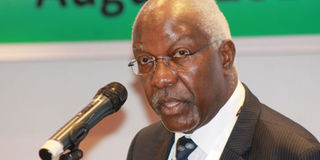Lack of policy hampering access to information from extractive industries for audit

Supreme Audit Institutions (SAI) Chair and Uganda Auditor General John Muwanga addresses delegates at Pride Inn in Shanzu during the International Organization of Supreme Audit Institutions (INTOSAI) conference in Mombasa on August 24, 2016. PHOTO | WACHIRA MWANGI | NATION MEDIA GROUP
What you need to know:
- The Auditor General said there was need for the government to formulate a policy on extractive industries to enable auditors to access information on oil and gas for audit.
- Speaking in the same meeting, Mining Principal Secretary Ibrahim Mohamed, said the government was in the process of developing a national extractive industries policy.
- Uganda’s Auditor-General John Muwanga, said lack of transparency and accountability in the extractive industries was to blame for conflicts in oil producing countries.
Lack of an extractive industries policy is among the challenges hampering auditors from accessing oil and gas information for audit.
Auditor-General Edward Ouko, said another major challenge was that the country had limited technical capacity on auditing extractive industries.
Speaking at Pride Inn in Mombasa on Wednesday, during the third annual International Organization of Supreme Audit Institutions (INTOSAI), Mr Ouko said the availability of a policy will enable auditors to easily access information on extractive industries.
Despite the limited capacity, he said that the group on audit of extractive industries was at the risk of losing the few specialized staff to other sectors in the economy.
The Auditor General said there was need for the government to formulate a policy on extractive industries to enable auditors to access information on oil and gas for audit.
“For auditors to come up with good and implementable audit recommendations, there should be an audit of extractive industries policy in place,” he said.
However, Mr Ouko noted that concerted efforts from government, development partners and experts could help address the challenges facing auditing of extractive industries.
On the other hand, he said that the costs recoverable from oil explorations has been a subject of concern for Supreme Audit Institutions.
“I have been to some of the locations across the world and noticed that these costs are being incurred by oil companies,” he said.
“It has been a subject for discussion lately, with renewed interests in making sure that whatever the companies are incurring are the accurate and valid costs,” he added.
Mr Ouko said his office would ensure that the oil firms recover only the costs that they incurred.
Speaking in the same meeting, Mining Principal Secretary Ibrahim Mohamed, said the government was in the process of developing a national extractive industries policy.
He added that the policy will address the bottlenecks facing the sector and support good governance and sustainable development of the extractive industries.
Dr Mohamed explained that the new Mining Act which took effect from May 2016 would also play a major role in addressing challenges facing the sector.
“Previously, we used to have a Mining law which was enacted in 1940. But now we have a progressive law which will ensure sustainable extractive industries activities,” he said.
Some of the issues covered in the Mining Act, he said, include benefit sharing of royalties with the government getting an allocation of 70 per cent, county governments 20 per cent while communities to get 10 per cent.
Others are that the Mining Cabinet Secretary is required to report on annual basis on all mining activities including royalties and other revenues collected, mineral dealings, licenses and block sizes by category of mineral rights, production and export volumes by category of minerals.
Uganda’s Auditor-General John Muwanga, said lack of transparency and accountability in the extractive industries was to blame for conflicts in oil producing countries.
“Oil industry can turn into a curse, if there is no openness about the revenue generated from the extractive industry,” he said.
The International Organisation of Supreme Audit Institutions meeting drew 70 participants from 36 countries.




